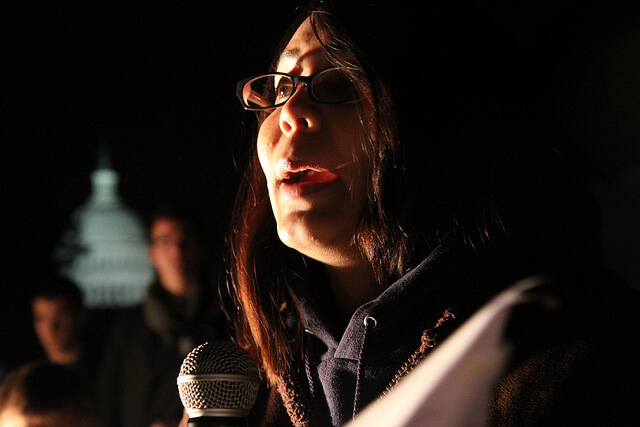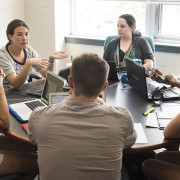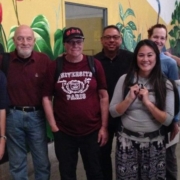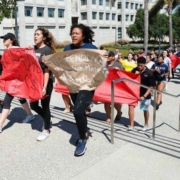We Must Do More: Say Immigration Advocates on 4th Anniversary of DACA Program
BY CHRIS KERR | June 15, 2016
On June 15, 2012, the U.S. Department of Homeland Security (DHS) announced the Deferred Action for Childhood Arrivals (DACA), program. Over the course of the past four years, DACA has had a major effect on the lives of over 700,000 young people who have received the deferred status, including hundreds students and graduates of Jesuit colleges and universities across the U.S. This deferred status has provided young men and women who came to the U.S. as children with the opportunity further their education, actively contribute to their communities, and offer support to their families.
Under DACA, immigrants without proper documentation who came to the country before age 16; were under age 31 at the time of the announcement; and had been in the country for five years when the initiative was announced are eligible to apply for a two-year reprieve from deportation and a work permit. The Migration Policy Institute estimates that there are approximately 1.16 million people who are currently eligible to apply for DACA.

Outside the Capitol, Maria Ibarra-Frayre (University of Detroit Mercy ’12) shares her immigration story during the Ignatian Family Teach-In for Justice in 2012.
“DACA is a crystallization of everything I’ve worked for,” said Maria Ibarra-Frayre, a 2012 graduate of University of Detroit Mercy who was also valedictorian of her class. After graduation she served for a year with the Jesuit Volunteer Corps in Milwaukee, followed by two years working on JVC’s staff, utilizing her DACA status, before beginning graduate school at the University of Michigan this fall. While DACA status has provided Ibarra-Frayre with access to many opportunities, she noted that it did not solve all the problems facing the immigrant community, saying, “Yet, at the same time it’s a bitter reminder that many people I know, many people in my community, were not as privileged to qualify for DACA. It’s both a step in the right direction and a reminder of the work that needs to be done.”
[DACA] is both a step in the right direction and a reminder of the work that needs to be done.
Maria Ibarra-Frayre – University of Detroit Mercy ’12
Catalina Adorno, a 2013 graduate of Saint Peter’s University, the Jesuit university in Jersey City, New Jersey, noted that DACA has provided her the opportunity to legally work in the United States. She described the situation that undocumented people like her faced prior to DACA as one of “fear and exploitation from employers.” Adorno is currently studying to earn a graduate degree in the School of Education at Columbia University. She also noted that while DACA has created some advantage for undocumented people “it has not solved the immigration issue.” Calling for further action, she said, “We cannot stop the fight for immigrants’ rights in the U.S until all immigrants are treated with respect and dignity.”
We cannot stop the fight for immigrants’ rights in the U.S until all immigrants are treated with respect and dignity.
Catalina Adorno – Saint Peter’s University, ’13
Leaders in Jesuit higher education have shown strong support for the needs of undocumented students attending their institutions. In 2014, Loyola University Chicago’s medical school became the first U.S. medical program to publicly accept undocumented medical students; Fairfield University partnered with other Jesuit institutions to publish research on the experience of students in Jesuit higher education in 2013; and last year Saint Peter’s University established a campus center to support the needs of undocumented students on their Jersey City campus.
“ISN stands in solidarity with undocumented students and graduates for which DACA more fully enables them to be part of our society,” said Christopher Kerr, executive director of the Ignatian Solidarity Network. “However, we must do more, noted Kerr, “We need compassionate comprehensive immigration reform that includes a pathway to citizenship for undocumented people contributing to our country, but forced into the shadows.”
We must do more. We need compassionate comprehensive immigration reform that includes a pathway to citizenship for undocumented people contributing to our country, but forced into the shadows.
Christopher Kerr, Ignatian Solidarity Network
Over the past five years, advocacy for comprehensive immigration reform has held a prominent place in the work of the Ignatian Solidarity Network. In February 2015, ISN coordinated a letter signed by twenty-five undocumented students and graduates of Catholic colleges and universities and delivered to seventy-eight members of the U.S. Congress who are fellow alumni, asking for Congress to “recognize their humanity,” by ensuring that the DACA program was not threatened by House legislation.
This past November, during the Ignatian Family Teach-In for Justice, over 1,200 young advocates visited Congressional offices on Capitol Hill to call for compassionate comprehensive immigration reform.
In February 2016, ISN initiated a Pope2Border campaign to lift up Pope Francis’s message of compassion for immigrants during his trip to the U.S.-Mexico border. Campus student groups were invited to establish campus mock border walls as a way to humanize the issue of immigration reform and initiate campus dialogue. On a number of campuses, the mock walls were defaced with anti-immigrant or racist statements.
Later this month the U.S. Supreme Court will issue a ruling regarding a lawsuit filed by over 20 state governors claiming that the Obama administration attempts to extend the Deferred Action for Childhood Arrivals (DACA) and add a Deferred Action for Parental Accountability (DAPA) program exceed the powers of the executive branch. While the decision will have no impact on individuals eligilibity for the original DACA program, the immigrant community supporters are very concerned about the impact a negative decision for these programs could have for undocumented populations.
Chris joined the Ignatian Solidarity Network (ISN) as executive director in 2011. He has over fifteen years of experience in social justice advocacy and leadership in Catholic education and ministry. Prior to ISN he served in multiple roles at John Carroll University, including coordinating international immersion experience and social justice education programming as an inaugural co-director of John Carroll’s Arrupe Scholars Program for Social Action. Prior to his time at John Carroll he served as a teacher and administrator at the elementary and secondary levels in Catholic Diocese of Cleveland. Chris speaks regularly at campuses and parishes about social justice education and advocacy, Jesuit mission, and a broad range of social justice issues. He currently serves on the board of directors for Christians for Peace in El Salvador (CRISPAZ). Chris earned a B.A. and M.A. from John Carroll University in University Heights, Ohio. He and his family reside in Shaker Heights, Ohio.









Trackbacks & Pingbacks
[…] Source. […]
Leave a Reply
Want to join the discussion?Feel free to contribute!